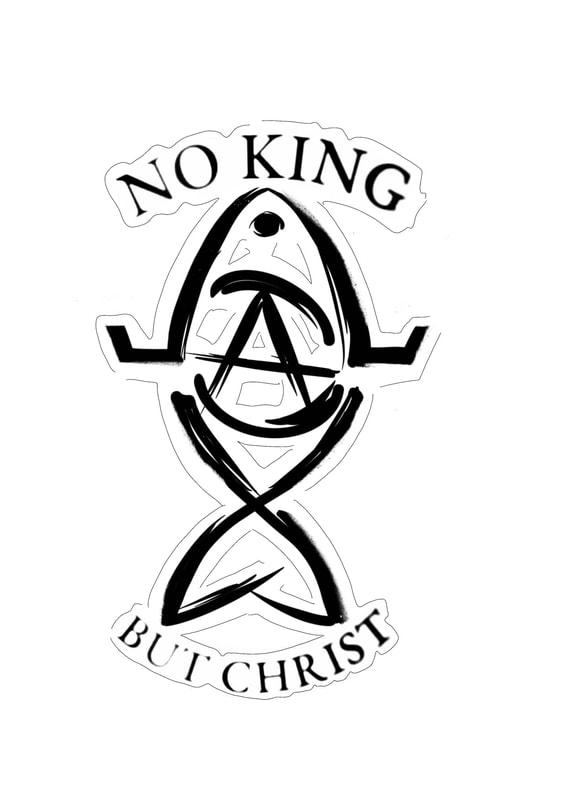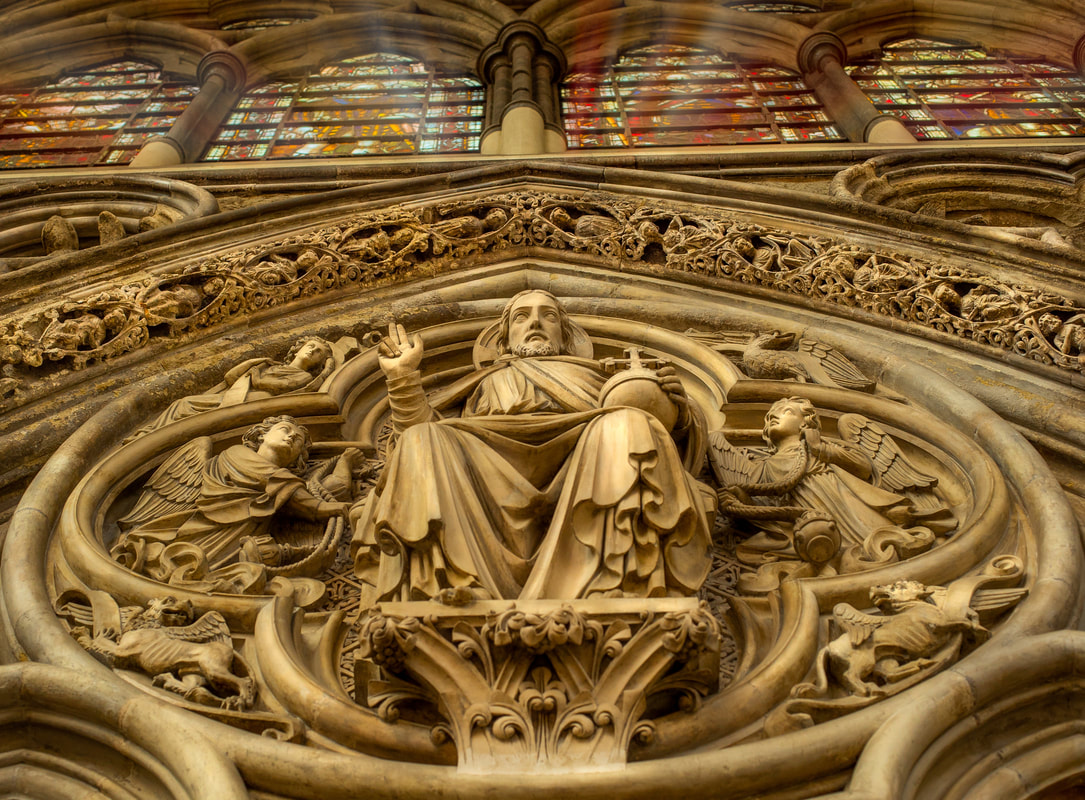|
The book of John is among one of four gospels in the New Testament, yet it is in a class of its own. While the other three gospels, Matthew, Mark, and Luke, are considered synoptic gospels, John is quite a bit different. John frames his gospel to accentuate various teachings not highlighted as much in the other gospels, particularly the teaching of the divinity of Jesus, the Christ. We get a glimpse of this elevation and framing from the very beginning of John's gospel as we see Jesus, the Word, residing with God and creating the universe. John's gospel is filled with this elevation and emphasis on the spiritual aspect of the good news of Jesus. Whereas Luke is more the historian with his focus on eyewitness accounts and social/political defense of Jesus and the early church (see "World Upside Down" and "Interweaving Innocence" for discussions of Acts and Luke), John is more the theologian.
Perhaps one of the most beautiful theological exhibitions in the book of John is found in chapter 3. Of course we are all familiar with verse 16, but what concerns us here is not verse 16's explanation of how our salvation obtains, but rather all that precedes the securing of salvation and instead answers the question, "what is obtained in our salvation?" Verses 3-7 are of particular interest here. They say, Jesus replied, “Very truly I tell you, no one can see the kingdom of God unless they are born again.” “How can someone be born when they are old?” Nicodemus asked. “Surely they cannot enter a second time into their mother’s womb to be born!” Jesus answered, “Very truly I tell you, no one can enter the kingdom of God unless they are born of water and the Spirit. Flesh gives birth to flesh, but the Spirit[b] gives birth to spirit. You should not be surprised at my saying, ‘You[c] must be born again.’ Photo by Sophia Clark on Scopi Evolution is a big deal in my community. Just about everyone hates the idea, and if you don't hate it, you'd better not let anyone know you don't. As conservative theists, most of us have problems with evolution because it feels like a threat to religion. If nature can accomplish all this order on its own, then what need would there be for God? Those theists who do cling to evolution, however, argue that it really doesn't matter if evolution is true or not. Evolution doesn't necessarily take God out of the picture, because God would still have had to create all matter, create and fine tune all natural laws, and could still intervene in his creation as he sees fit. There is no problem with believing in evolution and a God who is active in the world. Just as we don't believe that God is literally focusing his power on keeping the earth in its orbit, since God had the foresight enough to create the law of gravity to do his bidding, so it could be with evolution. God gets what he wants out of the process because he front loaded the information.
I find myself returning to contemplate the problem of evil time and time again. Maybe millennials (of which I barely make the cut) have a bigger hang-up with the way evil's existence seems to encroach on the possibility of a good God's existence, but I think the problem is much broader than one generation. Whether it's the death of a daughter leading Darwin to embrace his religious doubts, or the holocaust of a whole race which is remembered and lamented in the works of Elie Wiesel - each generation seems to have its own works and workers who wrestle with the reality of evil's existence. Evil is hard to stomach, and especially so if one is a Christian who proclaims the existence of an omnipotent, omniscient, and omnibenevolent God who supposedly despises evil.
In response to the problem of evil Christian history has produced a number of defenses for God. These defenses are known as "theodicies." A theodicy doesn't claim to prove that God exists or that its explanation for evil's existence is the correct one, but it merely offers what is a possible explanation for evil's existence alongside a good God. If the theodicy's explanation is logically possible, then evil's existence is not incompatible with the existence of God, even if this particular explanation doesn't end up being the correct one. The goal is simply to show that the existence of a good God and evil aren't logically incompatible. At the moment, the most broadly accepted theodicy on the market is the free will theodicy as refined and presented by Alvin Plantinga. Plantinga argues that for a God to create a world in which his creatures loved him in a meaningful sense, then those creatures would need to have the choice not to love him. God could have created robots that would have never disobeyed him or done any evil thing, but in creating such a world, he would have created a world where true love was impossible. So while it is true that evil exists, it's only in a world where evil is possible that love can exist, and God deems that the existence of love is worth the price of allowing evil. The Free Will Theodicy (FWT) is a beautiful defense because it makes a lot of sense. Everyone would love a world without evil, but we recognize that we'd all likely prefer a world where we make meaningful choices to love than a world where we were programmed robots - even if the price of love was the existence of evil. Love is such a beautiful and powerful thing that we recognize evil pales in comparison to it. The FWT is a fantastic defense of God, though as with all arguments, there are some problems. But it isn't in the scope of this article to expound on this theodicy or defend it. Suffice it to say that this is the going theodicy in Christianity, particularly Western Christianity. With the acknowledgement of this broad Christian adherence to the FWT, what I want to do, then, is actually draw out some implications this theodicy has for two other Christian positions: nonviolence and Christian anarchism. Click here for an audio/podcast version of this article. CONVERSION AND TRUTH
Everyone's an evangelist whether they know it or not. You may not be an evangelist for some large, organized religion or cult, but I guarantee you’re an evangelist for some belief. You are likely affronted by my calling you an evangelist because the term has taken on some very negative connotations in our age. The fervor, pushiness, judgmental nature, and self-righteousness of many evangelists likely fuels our aversion to the term - and rightfully so. Nobody wants to be evangelized because nobody wants to be objectified, and objectification is exactly what many evangelists do to potential converts. The evangelist's subject (or victim) is often merely seen as malleable gray matter - a fertile host into which the evangelist (or parasite) can inseminate their ideas. As an evangelist for Christianity, I take exception to these negative connotations of evangelism, though I certainly understand and agree with their application most of the time. Such an acknowledgement of evangelism’s misuse is a sober warning to me that even in my noblest of desires, my self-centeredness may be the overwhelming motivation with which I lead. But potential egoism isn’t the only way in which I might err. When evangelism fails to be a good thing, its failure must be seen as in one of two areas: the objectification of another (which simultaneously entails the self-centeredness of the evangelist) and/or the untruth of the message - the "good news" being preached. The following sample of resources are some of the pieces which I've read or created while thinking through the issue of politics. I attempted to use a broad selection of authors, from conservative Christians to the secular, so you can get different angles. Regardless of where you land, my hope is that you'll begin to see the world through the eyes of the gospel first, and politics second (or tenth).
There are quite a few people in my circles who aren’t too fond of all the demonstrations which have been going on. In their minds, all demonstrations related to racial issues are "riots," and all of the demonstrations are lead by leftist, Marxist, communist, anarchists. Many of the same criticisms conservatives once levied against the abolitionist or Civil Rights leaders of old are being reused against those claiming to fight racial injustice today. It’s certainly possible that the movement today is of a different character than it was the last several times movements arose in the face of racial upheaval. But it’s also possible that we conservatives who have always sought to conserve the status quo and our power have the same modus operandi today as we’ve always had. It's possible that we are denying injustice in order to preserve our position, just as we've always done. Time will tell, I suppose, as hindsight will eventually make current events more clear. But until then, I think it's important to have a good dose of honest and difficult self-reflection.
While I don’t know whether or not my conservative community is wrong in its majority assessment of the current events, I do want to speak into my community and highlight an inconsistency which I find rather bothersome. One of the most used arguments I see from Christians against the current social movement is that to join one's voice in the outcry is to jettison, forego, or downplay the gospel. To join the movement decrying injustice and calling for societal change is to embrace the social gospel. To join the movement is to declare that the gospel is not enough. What the world really needs is not social change or the social gospel. What the world really needs right now is the pure gospel of Jesus Christ, because it is only the gospel which transforms hearts. The argument here is that the eternal is more important than the temporal, and that if you get your eternal priorities straight, a change of your heart and spiritual focus will change your actions. If you accept the gospel of Christ you will also change your actions. If we just get everyone saved, racism will diminish. It is the gospel which changes society, not social movements, so we ought to spend our time accordingly. Christians, like any other group of humans, have their pet peeves. For me and my group of Christians, one of those pet peeves is the objectification of others. We recognizes that the objectification of others leads to deeper and more numerous sins, and therefore, we call it out as evil. When we elevate individualism to godhood and diminish a baby in the womb to the status of non-human - when we objectify babies - a baby who gets in our way can be killed. When sexuality and pleasure is elevated to godhood and another's body becomes a mere tool - when we objectify fellow humans for sexual gratification - then we end up with the highly exploitative and damaging pornography, sex worker, and sex-trafficking industries. Christians rightly identify Jesus's teaching that objectification is at the heart of much evil in the world. In Jesus's famous Sermon on the Mount, he declares that it isn't only murder and adultery which are evil, but the objectification of others in our hatred, anger, and lust - the latter vices being the seeds of the former. Jesus is a wise man, and we are wise to follow in his footsteps.
But just as Christians have pet peeves, we also have our pet sins. One of those pet sins is, rather coincidentally, objectifying others. Whereas my group has somehow managed not to buy into the overt acceptance and overlooking of the pleasure/sex pantheon of our culture, a different, perhaps more insidious form of idolatrous objectification has crept its way into our lives. Prosperity. Perhaps Jesus should have warned us a bit more about wealth and prosperity. Maybe he should have called it out directly or told some harsh stories about it. Maybe he should have given us some foreshadowing and foundation for the problem of prosperity in the Old Testament. Maybe he should have exiled Israel for their actions stemming from prosperous indulgence at the expense of justice towards others. Maybe if Ezekiel or some other prophet would have told us that the sin of Sodom was being guilty of idolizing prosperity - maybe that would have been enough for us not to make greed a pet sin and prosperity an idol. And perhaps if Paul had excoriated the greedy more than just a few times in the epistles, or if James, the brother of Jesus would have condemned opulence and unjust labor practices, everything would all be so clear to us now. But alas! I've always heard that it becomes much easier to understand our relationship with God after becoming a parent. I continue to find a great deal of truth in this. Right now Catalina and I have a hectic life. We have four kids under six, with two boys who are at peak craziness, and a five year old teenager. The big word running around in my mind the past few months has been obedience, because it is very clear to me that my children's obedience could significantly change how life runs right now. How do I develop obedience in my kids? If I could figure that out, it would make my life a whole lot easier. I have been thinking long and hard about how to handle my relationship with my kids, which has also begun to get me thinking about how my obedience (or disobedience) to God may have a similar appearance and patterns.
Obedience had always seemed like a cut and dry thing to me. If someone is in authority, you obey them because they said so. It's just the way it is. But as a parent, the anger which wells up inside me when my children disobey indicates to me that there is a lot more to obedience than some simple mathematical equation. When my kids straight-up look me in the eyes and disobey, I am infuriated. I have done a lot of soul searching on that, because the way I feel anger inside me is very clearly not good. It's not a righteous anger. It's a selfish anger. I recognize that in disobedience, my kids didn't merely fail a moral math equation, they offended me. Obedience is personal. Why is that? [To hear the extended podcast episode on this topic, check out our episode here].
Every week, from thousands of churches across the United States, requests for help are sent out. Food pantries are in need of workers and food. Women's shelters need volunteers. Children are in need of being fostered or adopted. Families are in need of financial assistance as they try to pay medical bills. And the list could go on. While the church does much good in the world, many requests go unanswered, and needs are left unfulfilled. And though I'm sure it's true that the church could do better, we also recognize that we will never be able to meet every need in such a fallen world. Decisions have to be made about how to use our time and resources in the way that best loves God and others. |
*The views and ideas on this site are in no way affiliated with any organization, business, or individuals we are a part of or work with. They're also not theological certainties. They're simply thinking out loud, on issues and difficulties as I process things.
Categories
All
|













 RSS Feed
RSS Feed